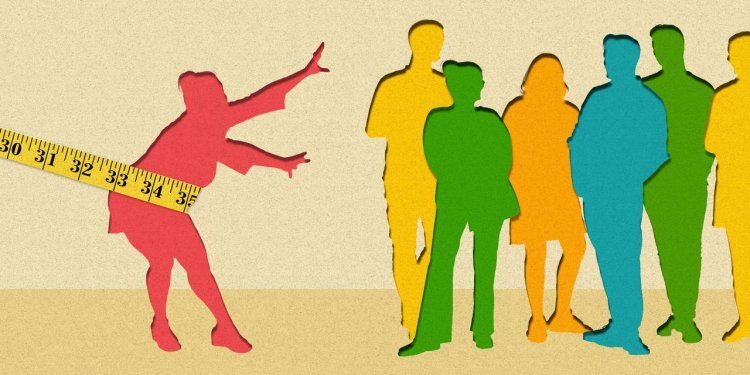The Hidden Career Cost of Being Overweight
New moves to outlaw weight discrimination are pushing companies to examine one of the most insidious forms of on-the-job bias Photo: WSJ; ISTOCK(3) By Ray A. Smith July 24, 2023 9:00 am ET Looking back, Michelle Matthews said she often internalized co-workers’ comments about her weight. At one work lunch, a teammate remarked on how much she was eating. A higher-up told her she needed to “show up physically as a leader” after she failed to win a promotion. It wasn’t until the tech-product design director switched to remote work in 2020 that she grasped how much such slights had colored her office career. “I didn’t realize how much I was thinking about my physicality,” said Matthews, 38, who describes herself as a big person. “It took up a lot of my mind.” Wei


Photo: WSJ; ISTOCK(3)
Looking back, Michelle Matthews said she often internalized co-workers’ comments about her weight. At one work lunch, a teammate remarked on how much she was eating. A higher-up told her she needed to “show up physically as a leader” after she failed to win a promotion.
It wasn’t until the tech-product design director switched to remote work in 2020 that she grasped how much such slights had colored her office career.
“I didn’t realize how much I was thinking about my physicality,” said Matthews, 38, who describes herself as a big person. “It took up a lot of my mind.”
Weight stigma is rarely talked about at work, but it pervades workplaces everywhere, employees and hiring managers say. Study after study shows heavier people are paid and promoted less than thinner colleagues and are often stereotyped as lazy or undisciplined. In a spring survey of more than 1,000 human-resources executives, 11% said an applicant’s weight had factored into hiring decisions. Half of managers surveyed in a separate poll said they preferred interacting with “healthy-weight” employees, according to SHRM, the human resources professional network that conducted the surveys.
Diabetes drugs could become an effective way to treat behavioral issues and addiction. WSJ’s Daniela Hernandez breaks down the science on how they work and how they could change psychiatry forever. Photo illustration: Elizabeth Smelov
Now, as New York City and some states move to outlaw weight discrimination at work, companies are beginning to focus on the experience of overweight workers. Many managers are unprepared for the wave of complaints the legislation could bring, advocates for the laws say.
Weight “is still not looked at from a [diversity and inclusion] perspective,” says Jessica Richman, founder of the Visible Collective, a group that advises companies on supporting workers and consumers who are considered obese.
New legal pressure
Signed into law in May, the New York City ban adds weight and height to the list of characteristics protected from discrimination, alongside race, gender, age, religion and sexual orientation. Several states, including New Jersey and Massachusetts, have introduced similar bills. (Michigan is currently the only state to prohibit employment discrimination on the basis of weight.

Tech leaders such as Amazon’s Jeff Bezos have been subject to scrutiny over their physiques.
Photo: chandan khanna/Agence France-Presse/Getty Images
Nearly two-thirds of employers haven’t addressed weight-related stereotyping or bias with their employees, according to SHRM. Though a small number of employers, such as Amazon, have formed employee groups to support overweight workers and raise awareness of “fat-shaming,” they remain the exception.
Even business leaders who have been vocal advocates of inclusive workplaces say they have given little thought to weight biases until recently.
“It wasn’t on my radar,” said Jonathan Mildenhall, co-founder and chair of global brand consulting firm TwentyFirstCenturyBrand, who says his company and its corporate clients will have to give the issue more attention. Employers may also need to reconsider workplace weight-loss challenges or other programs and benefits, including reimbursement for drugs such as Ozempic, he said.
Business leaders get buff
The body-positivity movement that championed fat acceptance, plus-size fashion models and extended clothing sizes over the past decade helped fuel the recent weight-discrimination legislation. Now, the rise of Ozempic, Wegovy and similar treatments may lead some people to conclude obesity is a choice if losing weight is a matter of taking a drug.
Pressure to be fit is already intense for anyone aspiring to rise through the management ranks, some executives say. The internet is awash in images and reports of how tech leaders such as Jeff Bezos and Mark Zuckerberg achieved their now-buff physiques. And some leadership coaches say staying trim is virtually a requirement for getting on the CEO track.
Keith Wolf, managing partner of recruiting firm Murray Resources in Houston, said he has never heard a corporate client cite a job candidate’s weight for deciding against them. But it would be naive to think appearance isn’t a factor. “You can just kind of look at who actually is hired for certain roles,” he said.

Former IBM Chief Executive Ginni Rometty said in a memoir that she was encouraged to lose weight to get ahead.
Photo: Alex Kraus/Bloomberg News
Companies, he added, are “worried about how leaders are perceived and everything they do, how they dress, how they show up in meetings.”
In her recent memoir “Good Power,” former IBM Chief Executive Ginni Rometty recounted how, earlier in her career, when she had put on weight, a boss suggested trimming down would help her get ahead.
Take a look at other high-level executives, and “most seem to be in good physical shape,” he pointed out to her.
Michael Hearn, a 59-year-old information technology program manager, says he has been overweight for much of his career. When he sought informal feedback as to why he was passed over for promotions, “they would say, ‘Everyone knows you’re a smart guy, everybody knows you work hard. You just don’t present well because of your size,’” he said.
He lost 200 pounds in recent years and has since left his job while he plots a career reset, he said.
Remote-work revelations
Remote work has transformed daily life for some people who are overweight. Matthews, the tech product design director, said she didn’t worry as much about what to wear or her physical presence once she began working from home in 2020. When on-screen, she could angle the camera in ways that flattered or played down her figure.
New job opportunities opened up, which she partly attributes to working and interviewing virtually. She landed a role in 2021 as a director of product design at a healthcare company, and later, a promotion to senior director.
“The course of my career really changed when I went remote,” she said.
Weight discrimination cases rarely succeed. Some workers have filed suits invoking the Americans with Disabilities Act, which protects job candidates and employees from discrimination, harassment or retaliation because of a disability. Most courts have held that obesity isn’t a disability under the ADA unless it is caused by an underlying health condition. The Texas Supreme Court said as much in a ruling in June, when it decided against a medical resident who alleged she had been fired from Texas Tech University Health Sciences Center because of her obesity.
Some companies have formed employee groups to raise awareness of fat bias. Amazon’s Body Positive Peers, formed in 2020, often uses its meetings and blog posts to highlight the corrosive effects of fat-shaming and ways to make the company’s products and services more size inclusive.
JAMS, a global provider of dispute-resolution services, launched a similar employee group two years ago. Its HR chief, Tracy Curry, says its existence helps signal to hires that the company cares about the challenges overweight workers can face.
Karen Pavlin, chief equity and inclusion officer of business-software company ServiceNow, said the new New York City law has prompted her to think more about weight as part of the company’s diversity efforts, especially in light of data showing Black and Latina women have a disproportionately high obesity risk.
ServiceNow’s TruAbility group, which advocates for employees with disabilities, also addresses issues around body size, Pavlin says. She expects other companies will follow with similar employee groups.
“It’s long overdue,” she said.
Write to Ray A. Smith at [email protected]
What's Your Reaction?














